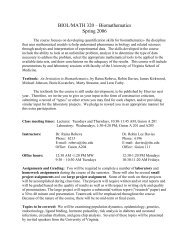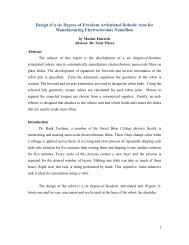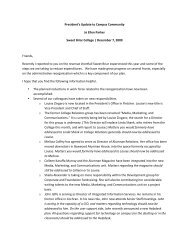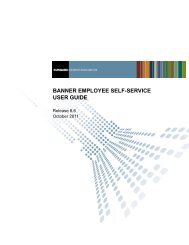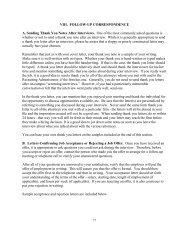sweet briar magazine inside - Sweet Briar College
sweet briar magazine inside - Sweet Briar College
sweet briar magazine inside - Sweet Briar College
Create successful ePaper yourself
Turn your PDF publications into a flip-book with our unique Google optimized e-Paper software.
WHEN MANY OF uS THINK OF<br />
GLOBALIzATION, we think of the West<br />
overwhelming the rest of the world, of chain<br />
stores and monopolies driving out the local fare,<br />
and the steady trickle of American jobs lost to<br />
overseas manufacturers. But Professor Debbie Durham’s fall<br />
course “Anthropology of Globalization” seeks a wider view<br />
and asks students to look at the complex ways that<br />
globalization occurs and affects our decisions. She guides<br />
students through a dizzying array of ideas and scenarios that<br />
show how globalization is being produced in industries,<br />
communities and families around the world.<br />
Debbie says that when anthropologists look at<br />
globalization, they focus on the individual: How do<br />
individuals solve problems in an environment now impacted<br />
by a global economy and mindset How do they react to<br />
shifts in economy, culture and family life How do they<br />
handle the new opportunities presented to them And, most<br />
of all, why are their decisions important<br />
To generate discussions of these questions, the class<br />
explores how McDonald’s isn’t just exporting American<br />
culture. Debbie notes that Spain, not the united States, was<br />
one of the first places you could use a credit card at a<br />
McDonald’s; that in China, locals appreciate McDonald’s<br />
because it treats all customers equally; that in Korea people<br />
see McDonald’s food as suitable for snack-time only; and that<br />
in some American McDonald’s you now can eat samosas and<br />
black beans that first appeared on menus overseas.<br />
McDonald’s is doing a lot more than what many Americans<br />
see as imposing on other cultures — while introducing<br />
American practices and items, it’s also borrowing and<br />
inventing others abroad, in response to people’s ways of<br />
living, and occasionally bringing them to the united States.<br />
“When asked for an example of globalization, people<br />
often think first of McDonald’s,” Debbie says. “But<br />
anthropologists are interested in the complex way<br />
McDonald’s becomes part of different people’s projects.”<br />
e global impact of non-governmental agencies,<br />
especially western humanitarian organizations in Africa,<br />
makes up another part of the course.<br />
“In zimbabwe, the individual effects that these<br />
organizations have are very complicated and surprising,”<br />
Debbie says. “Child-saving charities can cause family tensions<br />
and weaken the child’s ability to call upon support from a<br />
wide variety of people that typically would have been<br />
responsible. ey also undermine the way goods and wealth<br />
are distributed among family members.”<br />
At the same time, such organizations have also helped to<br />
empower children, and in some cases, given them the ability<br />
to start their own programs of social change under limited<br />
adult supervision. zimbabwe, Debbie notes, experimented<br />
with a Children’s Parliament that reported to the<br />
government, and has a child-led African Movement of<br />
Working Children and Youth.<br />
Although globalization is often thought of as the<br />
movement of western ideas and commodities, the course<br />
explores aspects of non-western influence as well. In countries<br />
around the world, Latin American telenovelas, Bollywood<br />
and Hong Kong kung fu films are popular, while American<br />
Hollywood films hold little interest. e Islamic fashion<br />
industry is another global movement that reaches from Asia<br />
into many parts of the world, including Great Britain and the<br />
u.S. as well as Niger and Indonesia.<br />
“We live in a world where how we live our lives can have<br />
an impact on women in Sri Lanka, children in Africa and<br />
local restaurants in Belize,” says Debbie. “Everything is<br />
connected. And an awareness of globalization is important<br />
for anyone working in any field today from banking to health<br />
care. ese are things to be aware of that will make you think<br />
creatively and should help you act responsibly, but also to see<br />
opportunities and work with them.”<br />
A professor at <strong>Sweet</strong> <strong>Briar</strong> since 1993, Debbie Durham<br />
has co-edited two books, “Generations and Globalization:<br />
Youth, Age, and Family in the New World Economy” and<br />
“Figuring the Future: Globalization and the Temporalities of<br />
Children and Youth.” Much of her research on youth has<br />
taken place in communities of Botswana; however, she is now<br />
undertaking a study of aging in Turkey.<br />
Recommended Reading:<br />
Arjun Appadurai, “Modernity at Large: Cultural Dimensions of Globalization” | Sidney Mintz, “<strong>Sweet</strong>ness and Power: The Place of<br />
Sugar in Modern History” | Aihwa Ong, “Flexible Citizenship: The Cultural Logics of Transnationality” | Richard Wilk, “Home Cooking<br />
in the Global Village” | Barbara Ehrenreich and Arlie Russell Hochschild, eds., “Global Woman: Nannies, Maids, and Sex Workers in<br />
the New Economy” | Colleen Ballerino Cohen, Richard Wilk and Beverly Stoeltje, eds., “Beauty Queens on the Global Stage”<br />
SBC.EDU | SWEET BRIAR MAGAZINE<br />
27





